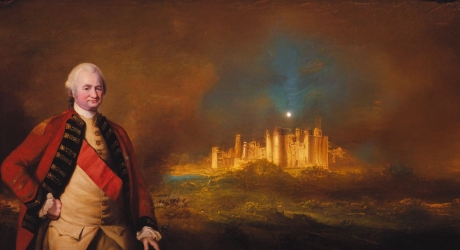Abdur Rahman ibn Muawiya ibn Hisham (113-172 A.H.), an Umayyad prince, having shown early signs of talent and intelligence, was given royal training and a superb education to groom him, right from early childhood, for his future role of Caliph.
But in 132 A.H. the Umayyad dynasty was dealt a fatal blow by the Abbasids. When the Abbasid army entered Damascus, the capital, they were given orders to exterminate the Umayyads. At this point, Abdur Rahman was fortunately absent from the city. He had gone to a village on the banks of Euphrates where he had his farms and orchards. At the time of the genocide, the young prince was just twenty years of age.
When Abdur Rahman learnt that the Ummayyads had been the victims of a general massacre, he hid himself in a camp under the trees. One day when he was in his camp his four-year old son came running to him in a terrified state. The Abbasid soldiers had almost reached the orchard in their pursuit of him. He immediately picked up the child, ran to the river and swam across to the other side.
Although Abdur Rahman managed to flee from Damascus, the next few years proved very difficult for him. Always on the alert for his enemies, he would move, hungry and thirsty, from place to place, across rivers and through jungles. In this state of helplessness he came to Sabta, a place situated at the north coast of Africa. His future looked bleak. The prince had become a pauper and where, in his childhood, the crown of the Caliphate had awaited him, there was now not even a corner where he could take shelter in peace.
Yet, ultimately, into this state of utter frustration, there shone a ray of hope. It seemed that Andalusia, in the South of Spain, had become semi-independent. Damascus, the seat of the Caliphate, had lost its hold over it, thanks to communications taking months to cover the distance between Damascus and Andalusia. Now in the absence of a strong leadership, the Muslims had started fighting amongst themselves.
This state of affairs in Andalusia turned out to be a piece of good fortune for Abdur Rahman. Hearing that the Muslims were badly in need of a leader, he crossed the Straits of Gibraltar to reach Andalusia. His extraordinary capabilities and the fact of his being a crown prince immediately attracted attention. The people rallied to him and he was able to establish a firm rule in Andalusia. A man whose history had come to an end in Damascus now became the founder of brilliant cultural and academic progress in Andalusia. If he built this most illustrious career for himself in Cordova the seat of the Andalusian emirate, it was entirely due to his own courage and determination.
It is a fact that there is no end to the opportunities in this world. When one opportunity ceases to exist, some other opportunity always arises elsewhere. When one stage in a man’s career comes to an end, there will always be the opportunity to enter a new phase.
But new opportunities will bear no fruit if they are not at once seized and availed of. Nothing ever happens on its own. But it takes a man of courage to grasp the opportunities that present themselves. He must also have the endurance and the determination for the struggle, which necessarily ensues. And if he possesses those essential qualities, there is no question of his being a failure.
This world has been devised by God so that man may succeed — but with a struggle. One who is too faint-hearted, too lacking in determination, or too impatient will give up the struggle sooner or later, and that is what will ultimately spell failure. He shall have to pay the price of his own shortcomings.
“For men, opportunities will never cease.” This is just like saying the sun will never cease to rise. Just as morning is always followed by night, so does success inevitably follow failure. However, just as the earth must revolve unceasingly if morning is to follow night, so must man be unremitting in his struggle to reach his final goal.
Source: Simple Wisdom









